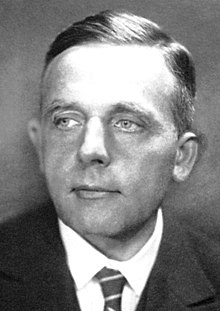
Back أوتو فاربورغ Arabic اوتو فاربورج (دكتور من المانيا النازيه) ARZ اتو واربورگ AZB Ота Генрых Варбург Byelorussian Ото Варбург Bulgarian অটো ভারবুর্গ Bengali/Bangla Otto Heinrich Warburg Breton Otto Heinrich Warburg Catalan ئۆتۆ ھاینریش واربورگ CKB Otto Heinrich Warburg Czech
Otto Heinrich Warburg | |
|---|---|
 Otto Heinrich Warburg | |
| Born | 8 October 1883 |
| Died | 1 August 1970 (aged 86) |
| Alma mater | University of Berlin University of Heidelberg |
| Known for | Oncometabolism Warburg hypothesis Warburg effect (oncology) Warburg effect (plant physiology) Warburg–Christian method |
| Awards | Iron Cross 1st class (1918) Nobel Prize in Physiology or Medicine (1931)[1] Pour le Mérite (Civil Class) (1952) Paul Ehrlich and Ludwig Darmstaedter Prize (1962) Foreign Member of the Royal Society[2] |
| Scientific career | |
| Fields | Cell biology |
| Institutions | Kaiser Wilhelm Institute for Biology |
| Doctoral advisor | Emil Fischer Ludolf von Krehl |

Otto Heinrich Warburg (German pronunciation: [ˈɔto ˈvaːɐ̯bʊʁk] , /ˈvɑːrbɜːrɡ/; 8 October 1883 – 1 August 1970), son of physicist Emil Warburg, was a German physiologist, medical doctor, and Nobel laureate. He served as an officer in the elite Uhlan (cavalry regiment) during the First World War, and was awarded the Iron Cross (1st Class) for bravery.[2] He was the sole recipient of the Nobel Prize in Physiology or Medicine in 1931.[1] In total, he was nominated for the award 47 times over the course of his career.[3]
- ^ a b Cite error: The named reference
prizewas invoked but never defined (see the help page). - ^ a b Krebs, H. A. (1972). "Otto Heinrich Warburg 1883-1970". Biographical Memoirs of Fellows of the Royal Society. 18: 628–699. doi:10.1098/rsbm.1972.0023. PMID 11615754.
- ^ Cite error: The named reference
nobelnomwas invoked but never defined (see the help page).
© MMXXIII Rich X Search. We shall prevail. All rights reserved. Rich X Search